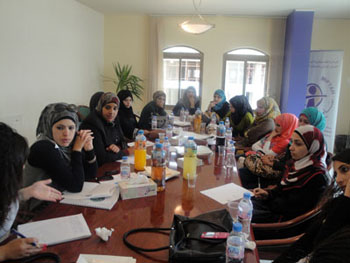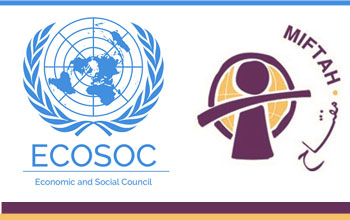
Ramallah – Activist Fawziyeh Suleiman from the Women’s working society in Hebron is proud of the knowledge and awareness she gained after enrolling in a training course carried out by MIFTAH as part of its “Empowering Young Women Political Leaders”, headed by Lamis Shuaibi, director of the Participation Enhancement Program at the organization. Several women involved in political and student activities participated from various Palestinian factions and movements. The project is funded by UNDP.
CEO of MIFTAH, Dr. Lily Feidy took this opportunity to stress that the project comes within the strategic goals of the organization, which are aimed at empowering the leadership components in society to participate in the promotion of democracy and good governance and to raise social awareness towards the rights and duties of good citizenry. She said they were also aimed at supporting young women leaders and empowering them to assume decision making and leadership positions in society.
Suleiman says: “MIFTAH’s course molded my character and I am now a leader in my community. I now run an institution and I give consultations to many women in my area. I am so happy to have achieved this, all because of what I learned from this training course.
Sarah Za’aeen, a student activist from the Gaza Strip, feels much the same way. Being part of this project was, she says ‘good and beneficial” for her and increased her knowledge overall. Equally as important, she continues, it changed how she is perceived in her own community. “I benefited a lot from the activities in this project,” she maintains. “Especially in terms of my relationship with my family; I am more capable and bolder now as an activist and as a Palestinian woman.”
Another Gaza student, Asmahan Al Zeiti, says she even shared her newfound experience with others. “I taught what I learned from the course to my friends and colleagues and even to my mother and sisters,” she says, “and ultimately changed the way I think and the way they think as well. This was really wonderful”
Lana Abu Bakr from Salfeet says she used to complain that she was discriminated against because she was a woman. Still, she maintains, she found people to stand by her side and give her the support she needed. With that, she was able to overcome that feeling and acquire awareness and knowledge both by her own accord and with the help of others who supported her, in this case referring to MIFTAH.
However, the trainings in this project posed a challenge of another kind for Abu Bakr in terms of her right as a political activist to run in elections and take on a prominent and equal position in her political party side by side with her male colleagues. “This was my major challenge,” she admits. “If my male colleague has a right to run, this is also my right.” She says some were surprised by her new convictions about this, given that she is a girl and relatively young. “Some would ask me: ‘How do you dare put yourself out there as a candidate to lead the executive committee or even as a member of the regional branch, or university elections?’ Perhaps this is what I benefited most from MIFTAH’s trainings; this courage,” Abu Bakr said.
Student activist Hadeel Ziadeh from Jerusalem tells a slightly different experience. She says her involvement in political action was met by opposition from her family, who then imposed certain restrictions on her. That did not stop her though from getting involved, restrictions or not.
The trainers in this project also voiced their opinions and experiences. Trainer Rateeba Natsheh, a political activist from Jerusalem says: “What I remember during my college years was that at first, I refused to join any political faction. I used to believe that the homeland was one united message, which a person must embrace and belong to and put ahead of any other affiliation.” She continues, “I also used to think that any woman who was able to achieve her aspirations of acquiring a political position had reached the ultimate goal – there were no more aspirations to strive for because of traditions and customs, which can easily limit them.” Later, she admits, she found that the reality of things was very different. “Therefore, we found it necessary to address our issues in stages and not tackle them in one go. This was reflected on all aspects of my life. And this is why when I participate in educating our girls and young women, I am careful that the issues we discuss are not final or absolute.”
Member of the general secretariat of the General Union of Palestinian Women Rima Nazzal, who was a guest in the training’s dialogue meetings with the young women leaders, describes what she calls “different gaps in society”, all of which need to be bridged and eliminated. “Let us first admit that there are a variety of gaps between sectors of society, including cognitive gaps, gaps in experience and expertise and in terms and concepts.” This is why these trainings are so important, she says. “These meetings and training serve the goal of eliminating or at least narrowing these gaps and creating a climate of understanding and harmony; they also offer an exchange of expertise between historical leaders who began their involvement early on, and other leaders who are just navigating their way into having a role in society.”
Director Lamis Shuabi, who supervised the project’s activities, said that: “Through empowering young political leaders, MIFTAH seeks to target a group of young women leaders. If we look back at Palestinian involvement in politics, we will notice that there has been a clear and prominent role for Palestinian women. However, recently, we have witnessed a setback and a lack of this role. Hence, through this intervention with some candidates nominated by the various political parties and political activists and also from student bodies in universities, we seek to offer them support by giving them opportunities to empower and support their leadership skills alongside decision-makers and people in official positions in political parties. This is with the goal of building their capacities and promoting their capabilities so they could reach decision-making positions.”
Shuaibi continued: “We are working on developing a network of active youth with vision and involving these women activists so that they could wield more influence, become motivators and have a bigger role in the network we are working to develop.”






